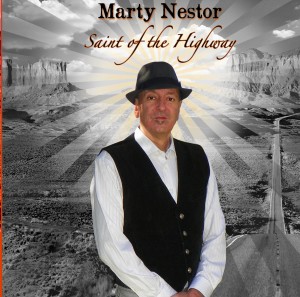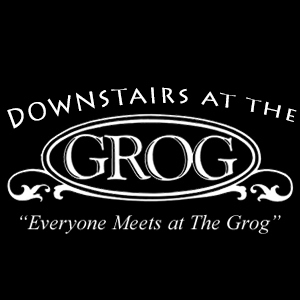 Marty Nestor has been sharing his edgy, roots rock originals all over greater-Boston for several years now. His latest CD Saint Of The Highway offers some exceptionally good new material and some exceptionally good re-recordings of older material. Nestor has the most earthy organic rock and roll sound since The Band.
Marty Nestor has been sharing his edgy, roots rock originals all over greater-Boston for several years now. His latest CD Saint Of The Highway offers some exceptionally good new material and some exceptionally good re-recordings of older material. Nestor has the most earthy organic rock and roll sound since The Band.
“Down On The Street” makes you feel its power as it barrels forward. It gets it edge from Nestor’s raw, raspy vocal and Doug Vennard’s electric guitar phrase. Jeff Root’s generous offering of hefty bass runs too contribute to this song’s battering ram solidity and forcefulness.
Title track “Saint Of The Highway” is a road song. Nestor finesses the number with his acoustic guitar grit and earthy vocal approach. Martin builds his vocal arc here with supremely confident aplomb as his band chugs along in low gear. The acoustic guitar notes ring with honest emotion in their soft quiet approach while drummer Kim Miller applies several tasteful applications of technique.
“Little Lady Lowdown” is a mixture of electric guitar bliss, a gentle but palpable rhythm section, and Nestor’s easy going approach to unfurling his sandpapery voice. You can hear echoes of The Band in the unpretentious solidity of this number. Nestor sustains a vocal note and you can hear his sincerity as it carries.
“The Sad, Sad Story Of Sammy Lee” is a mid-tempo rocker that unfurls its wide bountiful sound and nice subtle touches as it chugs with the steady momentum of a locomotive. Even at mid-tempo, Nestor and his boys are hard-driving, especially as Nestor sustains his cowboy-tough vocal notes, and Vennard presses some edgy notes out of his axe. Nestor slyly gives a little greasy slide while the rhythm section moves it with their pushy, muscular power.
“Heart Like A Wheel,” written by Nestor’s bass man and producer Jeff Root, could’ve been a classic rock radio staple if it came out in the 1970s. The song has the common man poetry and organic rock sound that comes from the same school as Tom Petty, Bob Dylan, or Bruce Springsteen. Clearly rooted in old rock idioms, this song has the kind of soulful abandon at the microphone that forces you to reckon with its huge sound. The harmonica is rich with soul, feeling, and struggle, making you hear history in its blues-drenched notes.
“Sweet Little Angel” graces the CD with its rangy guitar phrases and Nestor’s guttural whiskey-soaked vocal. Haunting, rangy slide guitar notes cry out their plaintive loneliness. They widen the soundscape of this tune, making it similar to a film score in its ability to express a scene with a ton of emotion. You almost picture a cowboy walking across a desert to get to his sweet little angel.
The steady muscular rhythm section push “Up Through The Ashes” along with the palpable dollops of bass and steady tasteful drum work that often mark this project. It’s refreshing to hear a rhythm section be such an essential cornerstone of a band’s sound. Nestor and Vennard fill in the open spaces with their balance of assertive vocal and subtle electric guitar picking.
A twangy electric guitar and a shuffle beat help Nestor due justice to “Mystery Train.” Nestor captures the emotive fulsomeness of this old country classic with his raw, rangy belt. He sings this one like he means it, and he offers freshness to a song that’s become a blues jam and bar-band cliché.
“Tell Me What You Want” is a ruggedly handsome soundscape of acoustic and electric guitars churning out grit and gravel. Vennard’s presses out electric guitar glory, phrasing that combines precision with a country roots timbre that can’t be beat. Nestor gets almost ornery in his tone, making for another earnest exploration of the American sound. His acoustic guitar interlude near the end is western style heaven.
Nestor co-wrote “Good Times Tonight” with Root and Phippin to come up with something that takes wide twists and turns. You can feel a large sense of movement in this song, and it’s easy to get caught up in its purposeful stroll.
Nestor’s signature song “JimmyJohnJohnny” got a re-recording for this album. The song still packs as much gritty punch as ever, but there is more clarity in the individual instruments. Nestor’s childhood was haunted by this kid who shook down younger kids for their pocket money. Years later, Nestor found out that the kid grew up to be a moon shiner who got a stiff sentence. Nestor and his boys create a sense or urgency in the music to make the listener feel the dark, driving, force of nature that this bad boy was.
“The Rain Came” features a sweeping harmonica line that ushers the song in with hearty swagger. Nestor, as usual, projects a range of emotions with his earthy drawl. You feel like you’re listening to one of the greats from yesteryear because Nestor is so steeped in the idioms and traditions of old Americana music. He also has one of the richest voices around and that helps him nail down the vast array of emotions in his lyrics.
Nestor closes out with a solo acoustic guitar version of Johnny Cash’s “Man In Black.” Nestor proves here that he is a force to be reckoned with even without accompaniment. He has a voice that clarions what he has on his mind and he has an expressive way with his acoustic guitar. Nestor has been around for a long time now, and he will likely be around for several more years. His new album Saint Of The Highway is a must for any collector of great local music.

